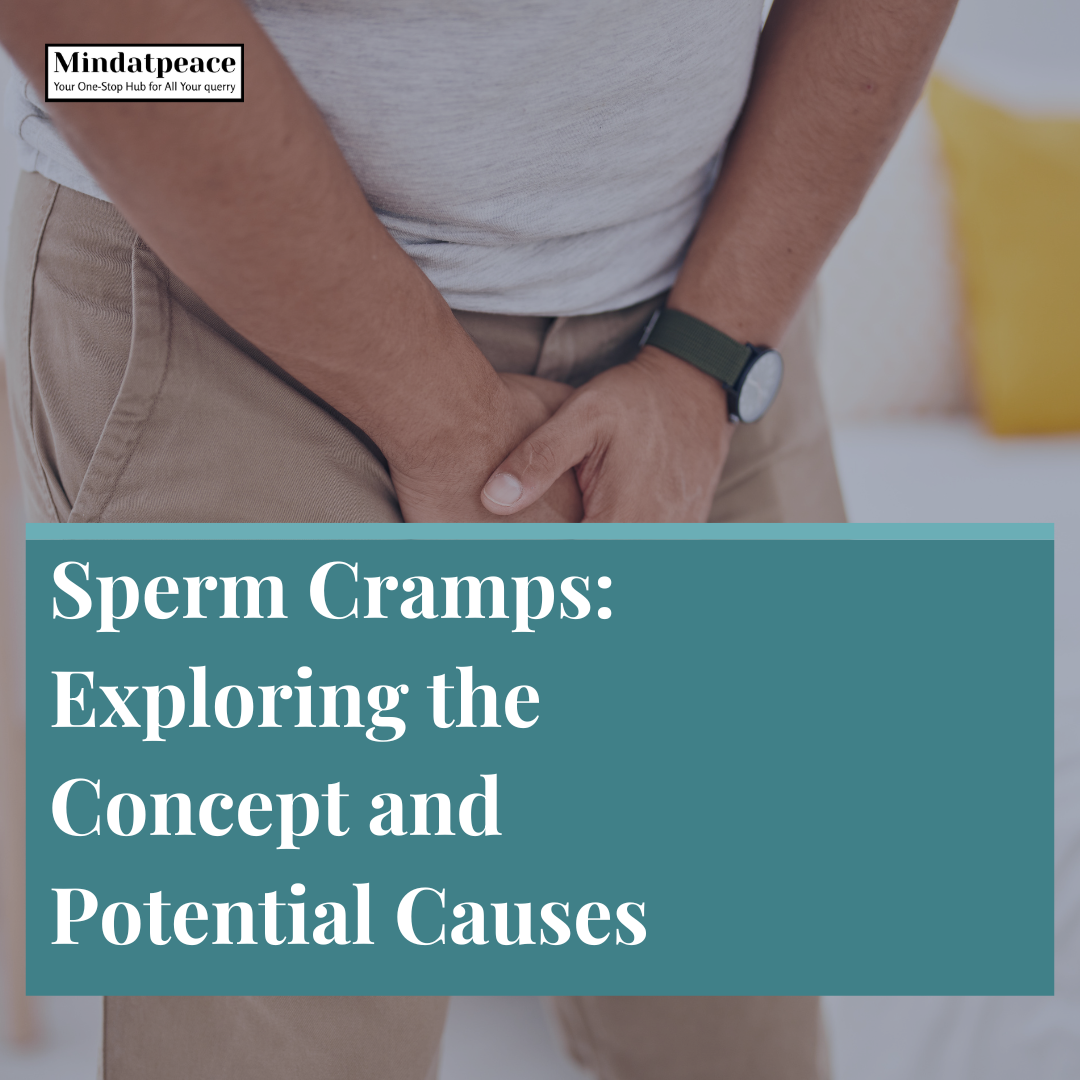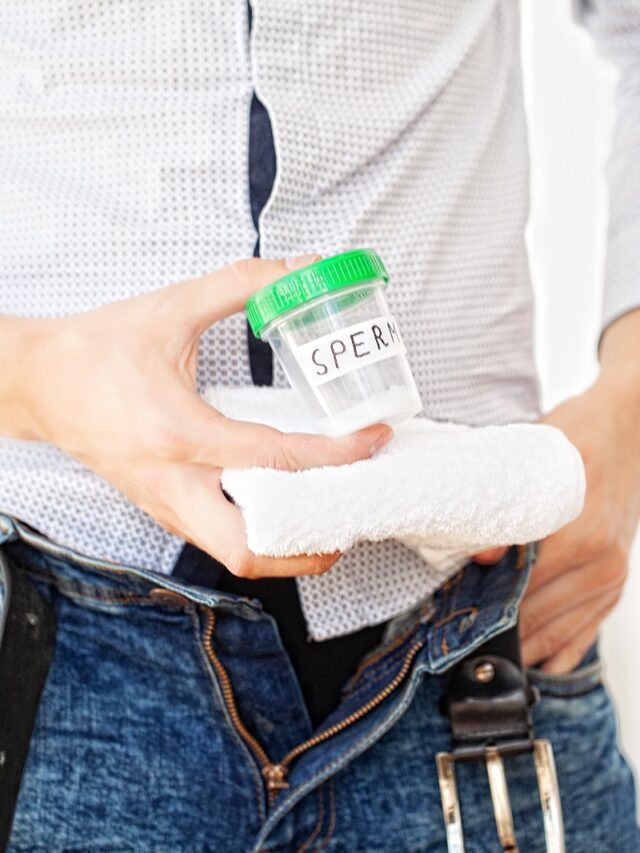Sperm Cramps: Exploring the Concept and Potential Causes is a phenomenon characterized by discomfort or pain in the pelvic region after sexual activity, particularly following ejaculation.
Understanding the Physiology
What Happens During Ejaculation?
During ejaculation, a symphony of muscles orchestrates the propulsion of semen through the urethra. This finely choreographed dance involves the coordinated contraction of muscles in both the pelvic floor and abdomen, working seamlessly to facilitate this vital process.
Are Sperm Cramps Painful?
Yes, sperm cramps can be painful for some individuals. The pain associated with sperm cramps typically manifests as a dull, achy sensation in the lower abdomen, groin, or perineum. Some people may also experience headaches or muscle cramps in other parts of the body following sexual activity. The intensity of the pain can vary from mild discomfort to more severe and prolonged sensations. It’s important to note that the level of pain experienced may differ from person to person and can depend on factors such as the individual’s physical condition, hydration status, and the intensity of sexual activity.
Symptoms and Signs
Pain Description
Sperm cramp typically presents as a dull, achy pain in the lower abdomen, groin, or perineum. Additionally, some individuals may encounter headaches or muscle cramps in other areas of the body.
Duration and Intensity
The duration and intensity of sperm cramps can vary widely among individuals. Some may experience mild discomfort that resolves quickly, while others may endure more severe pain lasting for hours or even days.
Causes of Sperm Cramp
Overstimulation
Partaking in prolonged or intense sexual activity without sufficient rest or hydration can exert considerable strain on the muscles implicated in ejaculation, potentially resulting in cramping and discomfort.
Lack of Ejaculation
In certain instances, postponing or inhibiting ejaculation can lead to congestion and tension in the pelvic area, culminating in post-coital discomfort.
Dehydration and Electrolyte Imbalance
Dehydration and electrolyte imbalances can significantly worsen muscle cramps and discomfort during or after sexual activity. Inadequate hydration not only diminishes lubrication but also intensifies friction, amplifying overall discomfort.
Risk Factors
Frequency of Sexual Activity
Frequent or vigorous engagement in sexual activity can render individuals more vulnerable to sperm cramps, particularly when adequate hydration and rest are overlooked.
Age and Physical Condition
Age and physical condition can significantly influence the likelihood of experiencing sperm cramps. Older individuals and those with pre-existing muscle or pelvic floor disorders may be at a higher risk.
Prevention Techniques
Hydration
Maintaining adequate hydration is crucial for preventing sperm cramps. Drinking plenty of water throughout the day helps ensure optimal muscle function and reduces the risk of dehydration-related discomfort.
Stretching and Relaxation Techniques
Incorporating regular stretching and relaxation exercises into your routine can effectively alleviate muscle tension and enhance flexibility in the pelvic region. By doing so, you significantly reduce the likelihood of experiencing cramping during sexual activity.
Regular Ejaculation
Regular ejaculation serves as a proactive measure against congestion and tension in the pelvic area, effectively lowering the chances of post-coital discomfort. Furthermore, open communication with sexual partners regarding individual needs and preferences is paramount for nurturing sexual health and overall well-being.
Treatment Options
Rest and Relaxation
Allowing adequate rest for the muscles to recover post-sexual activity is instrumental in alleviating discomfort linked with sperm cramps. Additionally, indulging in a warm bath or applying heat to the affected area can offer further relief.
Hydration Strategies
Boosting fluid intake and replenishing electrolytes are crucial steps in alleviating dehydration and warding off muscle cramps. It’s advisable to consume hydrating beverages like water, sports drinks, or electrolyte solutions for optimal hydration and muscle function.
Over-the-counter Medications
Over-the-counter pain relievers like ibuprofen or acetaminophen can effectively reduce inflammation and ease discomfort linked with sperm cramps. However, it’s imperative for individuals to seek guidance from a healthcare professional before initiating any medication regimen.
When to Seek Medical Help
If sperm cramps persist or worsen despite self-care measures, it is imperative to seek guidance from a healthcare provider. Persistent or severe pelvic pain could signal an underlying medical condition that necessitates thorough evaluation and treatment.
Conclusion
In conclusion, sperm cramps are a common but often overlooked aspect of sexual health. Understanding the causes, symptoms, and prevention strategies can help individuals manage discomfort and maintain a fulfilling sex life. By prioritizing hydration, rest, and communication, individuals can minimize the risk of experiencing sperm cramps and enhance overall sexual well-being. For more information, visit Mindatpeace.
FAQs
Q. Can sperm cramps affect fertility?
A. Sperm cramps are typically benign and do not affect fertility. However, persistent or severe pelvic pain should be evaluated by a healthcare professional to rule out underlying conditions.
Q. Are sperm cramps more common in men or women?
A. Sperm cramps primarily affect individuals with male anatomy, as they involve the muscles and structures associated with ejaculation. However, individuals of any gender may experience post-coital discomfort for various reasons.
Q. Can dehydration worsen sperm cramps?
A. Yes, dehydration can exacerbate muscle cramps and discomfort during sexual activity. Staying hydrated is essential for optimal muscle function and overall well-being.
Q. How long do sperm cramps typically last?
A. The duration of sperm cramps can vary widely, ranging from a few minutes to several hours or even days. It depends on factors such as the individual’s physical condition, hydration status, and the intensity of sexual activity.
Q. Are there any specific exercises to prevent sperm cramps?
A. Engaging in regular pelvic floor exercises, such as Kegels, can help strengthen the muscles involved in ejaculation and reduce the risk of cramping. However, it’s essential to consult with a healthcare professional before starting any new exercise regimen.





